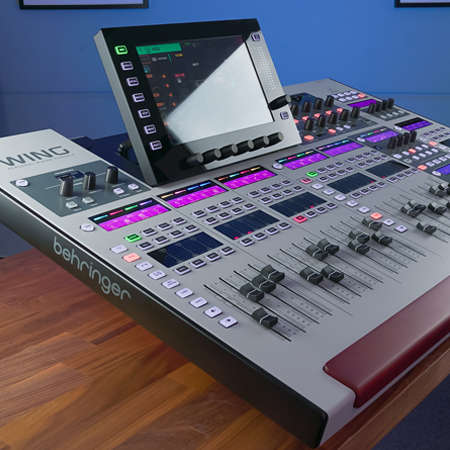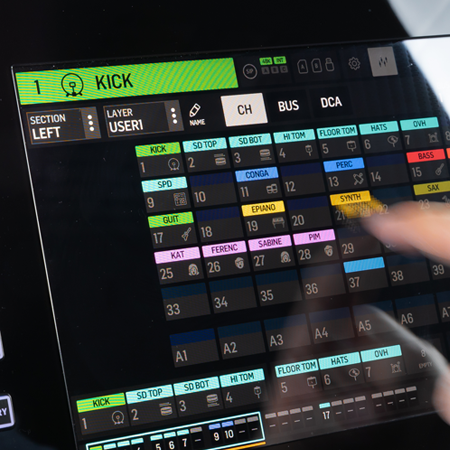Wing 48 Kanal Dijital Mixer
48-Channel, 28-Bus Full Stereo Digital Mixing Console with 24-Fader Control Surface and 10" Touch Screen
Product Features
-
8 award-winning Midas PRO mic preamps and 8 Midas PRO outputs onboard
-
24 motorized 100 mm faders in 3 separate, fully configurable sections
-
"Plug and play" remote I/O connectivity for up to 144 input and output signals over 3 AES50 ports featuring Klark Teknik's SuperMAC technology for ultra-low jitter and latency
-
Large main display with capacitive touch screen and adjustable display swivel
-
Unique touch-sensitive channel editing section with 11 rotary controls and dedicated color TFT for staying on top of all channel properties
-
Optional module for 64 x 64 channels of audio over Ethernet – supporting WAVES SoundGrid Technology or Dante/AES67 Technology
-
48 x 48 channel USB 2.0 audio interface onboard with DAW remote control emulating HUI and Mackie Control
-
Dual-SD card live recorder/player with up to 64 tracks and markers for identifying song positions
-
Additional 4-channel control section with rotary controls, buttons and parameter display for permanent access to mains, matrices or "money-channels"
-
Premium FX rack with 8 true-stereo processors and world-class TC algorithms, Lexicon, Quantec and EMT emulations
-
Standard FX rack with 8 true-stereo processors for a wide array of modulation, EQ, dynamics etc. - also allows blending outboard effects to the mix
-
5 variable plug-in processing slots for all 40 stereo input channels, featuring the most iconic vintage analog equalizers and compressors, plus insert FX slot and 4-band parametric EQ for all 8 stereo aux channels
-
Custom Controls offering 16 latching or momentary buttons and 4 rotary controls, easily being configured for preferred functions
-
4 main, 8 matrix and 16 aux stereo buses, featuring dual inserts, 8-band parametric EQ's, stereo imager and full dynamics processing
-
2 Ethernet ports with integrated switch for networked remote control
-
Built-in expansion port for optional audio interface cards or digital networking bridges, MADI and ADAT/WC
-
StageCONNECT 32-channel low-latency interface for personal monitoring or analog I/O boxes, AES/EBU stereo digital in- and outputs on balanced XLR, 8 x 8 balanced TRS auxiliary line in- and outputs, 2 TRS phones connectors, MIDI I/O and 4 GPIO ports

The Personal Mixing Console
The WING control surface utilizes a large capacitive touchscreen interface with touch-sensitive rotary controls for a new ease of operation. Three separate fader sections and a Custom Controls section can be tailored easily and intuitively to meet your personal requirements. No matter if you need a specific bus send fader next to the corresponding channel fader, or a dedicated “money” channel always at your fingertip, or even sharing the surface with two engineers - WING can be configured to elevate your production to a new level. You can even replace and customize the massive wooden armrest with something funkier if you like. The technical drawing can be found in the Downloads section of the product page.

Why Sources?
What is the purpose of mixing in the first place? While considering the signal path of audio production for live or studio applications, we were stunned to find that much of the terminology is still driven by historical technical implementation, rather than its actual purpose. Normally, consoles focus on input numbers assigned to channels and auxes. WING is offering a substantially different perspective by focusing on the Source as the reason for any mixing, say a bass drum signal or the lead vocal. Inputs are therefore given more properties than just a number. Sources can be in mono, stereo or mid-side mode, own headamp parameters like gain and phantom power, with specific source mute and metering. They can also be given a color, icon, name and several tags for grouping and filtering purposes. All of this describes the actual Source first, before channels are used for processing or mixing.
The beauty of this is that you can label Sources using our WING Co-Pilot app while patching on stage and no matter if the signal is patched to a channel, to SD recording or to any other output, you will always see and refer to that Source.

Mono/Stereo
All 48 input channels and 28 bus mixes can be used for mono, stereo or mid-side sources. Assigning a stereo source to any channel automatically renders the channel stereo, and its stereo imager stage provides control over width from 150% stereo down to mono. The console does not need a reboot to apply any mode changes. Their channel, bus and subgroup configuration can be changed any time on the fly. See why it is a WING?







